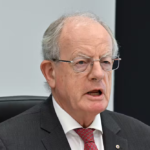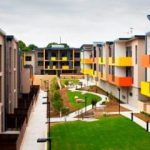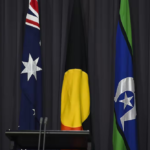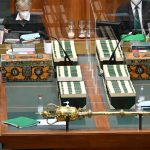Leading the charge to find a cure for MS
Throughout May the Kiss Goodbye to MS campaign raises funds for vital research into multiple sclerosis. Renee Coffey tells her journey with MS.
I will always remember the day I got the “probable” diagnosis for multiple sclerosis (MS). It was 2011. I was 29 years old, newly married and in the process of moving to Sydney with my husband for a significant promotion.
In a Bondi Junction neurologist’s office, the backlight revealed two “sizeable” lesions on my MRI, and it became clear why I had been experiencing so many strange neurological symptoms. I headed straight to the airport. My husband and family were in Brisbane and I knew that’s where I needed to be.
In the lounge waiting for my flight, I phoned my boss and mentor – Executive Director of the Australian Indigenous Education Foundation, Andrew Penfold.
We discussed many things, but I remember saying to Andrew that looking into the future I didn’t want MS to define me; and in no way did I want it to become an integral part of my identity. I had worked hard in my career and at most, no matter how severe, I wanted MS to be a small footnote in the story of my life.
Over the ensuing four years, my initial views changed markedly.
Around 23,000 Australians are living with MS. It is a disease of the central nervous system, disturbing nerve impulses within the brain, spinal cord and optic nerves. Many symptoms of MS are easy to hide – especially in the early stages of the disease.
Since my probable diagnosis, I have met several people who choose to conceal their MS diagnosis. This is out of fear of prejudice and discrimination from family, friends, romantic interests and most prominently – from employers. Considering the support I received from Andrew and my colleagues this was, and still is, shocking to me.
I soon also realised very few people in Australian public life live openly with MS. Exceptions include Ipswich Mayor Paul Pisasale, Simon McKeon AO, Prof George Jelinek, Tim Ferguson, Jason Jordan and the late Chrissy Amphlett.
I am convinced there are many more prominent and every day Australians that choose to keep their MS diagnosis private.
In early 2014, three years after my initial diagnosis, MS Research Australia invited me to become a Kiss Goodbye to MS Ambassador.
MS Research Australia is the largest not for profit organisation working to accelerate Australian MS research toward the prevention, better treatments and a cure for MS.
I knew that taking on this role would mean that my MS would be somewhat elevated out of the footnotes of my life. Ultimately, my decision to publicly support the Kiss Goodbye to MS campaign was a result of several considerations.
One reason I chose to step into a public ambassador role is because people facing a diagnosis of MS need examples of other people who live a full and productive life with this condition. The newly diagnosed need to see that with significant lifestyle changes it can also be a reasonably healthy life. Without more people living openly with MS, the diagnosis journey for many more Australians will continue to be an unnecessarily fearful one.
I believe that by encouraging others to disclose their diagnosis, employers are given the opportunity to provide appropriate support to people with MS. A recent Australian study showed that disclosing a diagnosis of MS in the workplace is, on average, associated with greater employment retention.
More people disclosing their diagnosis will further highlight the need for vital medical research to be undertaken. Australia is leading the charge in MS research but significantly more funding is needed to continue this vital work. We know so little about this disease and we do not yet fully understand how it develops. We need treatments for it in its progressive form and we are yet to find a cure. This research will not happen simply because it is needed, or because it is right or fair. It takes money, public support and political will.
Since 2011, I have been very fortunate with my health. My husband and I have had two sons, I completed a Graduate Certificate in Social Impact and I have continued in a senior role with the Australian Indigenous Education Foundation. Most importantly, I remain a passionate supporter of the work of MS Research Australia.
Renee Coffey (@rey_coffey) is a 2015 Kiss Goodbye to MS Ambassador and Projects Director at the Australian Indigenous Education Foundation. She is a wife and mother to two-year-old Alexander and new baby Lewis. Following her diagnosis of probable MS in 2011, Renee converted to a plant-based and seafood diet, with regular sunshine, omega 3s and exercise and has to date been relapse free. In early 2015 a second MRI confirmed Renee’s diagnosis. Renee is excited that Australian researchers are leading the charge to find a cure for MS.













